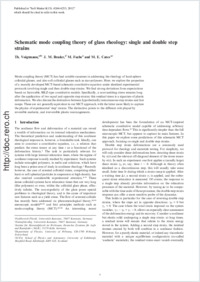Schematic mode coupling theory of glass rheology: single and double step strains
- Voigtmann, Th. Fachbereich Physik, Universität Konstanz, Konstanz, Germany - Zukunftskolleg, Universität Konstanz, Germany - Institut für Materialphysik im Weltraum, Deutsches Zentrum für Luft- und Raumfahrt (DLR), Köln, Germany
- Brader, Joseph M. Department of Physics, University of Fribourg, Switzerland
- Fuchs, M. Fachbereich Physik, Universität Konstanz, Konstanz, Germany
- Cates, M. E. SUPA, School of Physics and Astronomy, University of Edinburgh, Mayfield Road, Edinburgh, Scotland
-
03.02.2012
Published in:
- Soft Matter. - 2012, vol. 8, no. 15, p. 4244-4253
English
Mode coupling theory (MCT) has had notable successes in addressing the rheology of hard-sphere colloidal glasses, and also soft colloidal glasses such as star-polymers. Here, we explore the properties of a recently developed MCT-based schematic constitutive equation under idealized experimental protocols involving single and then double step strains. We find strong deviations from expectations based on factorable, BKZ-type constitutive models. Specifically, a nonvanishing stress remains long after the application of two equal and opposite step strains; this residual stress is a signature of plastic deformation. We also discuss the distinction between hypothetically instantaneous step strains and fast ramps. These are not generally equivalent in our MCT approach, with the latter more likely to capture the physics of experimental ‘step’ strains. The distinction points to the different role played by reversible anelastic, and irreversible plastic rearrangements.
- Faculty
- Faculté des sciences et de médecine
- Department
- Département de Physique
- Language
-
- English
- Classification
- Physics
- License
- License undefined
- Identifiers
-
- RERO DOC 29239
- DOI 10.1039/C2SM06891E
- Persistent URL
- https://folia.unifr.ch/unifr/documents/302502
Statistics
Document views: 70
File downloads:
- bra_smc.pdf: 92
